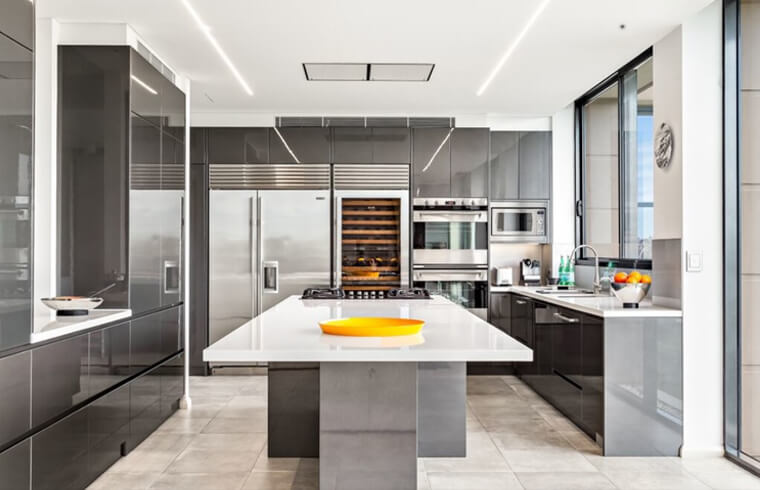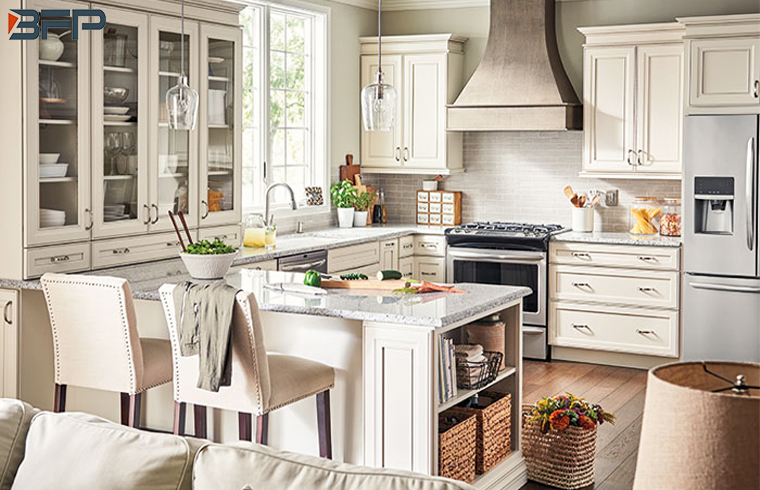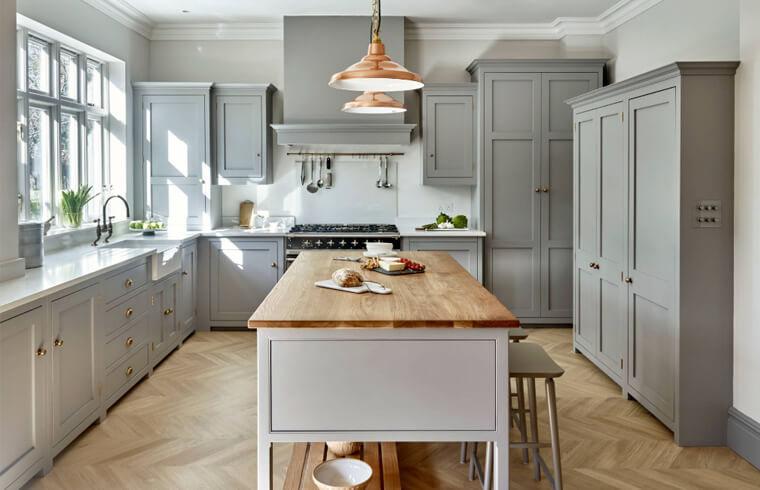Installing kitchen cabinets usually takes 2-3 days when using standard options. Contractors often complete the process within this timeframe if everything goes smoothly. For larger kitchens or custom cabinets, the installation time can extend to 3-7 days. Factors like preparation and cabinet type significantly influence how long it takes to install kitchen cabinets.

Several factors can influence how long it takes to install kitchen cabinets. Understanding these variables helps you plan your project more effectively and avoid unnecessary delays.
The size and layout of your kitchen play a significant role in determining the installation timeline. Smaller kitchens typically require 1–2 days to install cabinets, while average-sized kitchens may take 5–7 days. Larger kitchens, especially those with unique layouts, can extend the process to 14 days or more. A complex layout often demands additional customization, which increases the time needed.
Kitchen Size | Installation Timeframe |
Smaller Kitchens | 1–2 days |
Average Kitchens | 5–7 days |
Larger Kitchens | Up to 14 days or more |
The type of cabinets you choose also affects the installation schedule. Stock cabinets are pre-made and readily available, making them quicker to install. Custom cabinets, on the other hand, require design, manufacturing, and intricate installation, which can significantly extend the timeline.
Cabinet Type | Installation Duration | Reason for Duration Difference |
Stock Cabinets | Quicker | Pre-made and readily available, requiring less time. |
Custom Cabinets | Longer | Requires design, manufacturing, and intricate installation. |
Proper preparation before installation ensures a smoother process. This includes taking accurate measurements, ordering materials in advance, and conducting site inspections. These steps reduce delays and errors, helping you stick to your installation schedule. Without adequate preparation, you risk encountering unforeseen issues that could disrupt the timeline.
Careful measurements prevent fitting problems.
Ordering materials early avoids shipping delays.Site inspections identify potential obstacles.
The skill level of your installer directly impacts the installation time. Experienced professionals anticipate and resolve potential issues quickly, ensuring a smoother process. While a typical installation takes 3–5 days, larger or more complex projects may require additional time. Quality workmanship and thorough planning are essential for staying on track with your kitchen remodel timeline.
By considering these factors, you can better manage your expectations and create a realistic installation schedule for your kitchen cabinets.

Understanding the kitchen cabinet installation process helps you plan better and ensures a smoother experience. Each step plays a crucial role in achieving a functional and visually appealing kitchen.
Accurate planning and measurements form the foundation of a successful installation. Use a tape measure to determine the dimensions of your kitchen. Mark the locations for cabinets, appliances, and plumbing. Double-check your measurements to avoid errors. A laser level can help ensure precision when marking cabinet heights and alignment points.
Before installing cabinets, you need to remove the old ones. Start by emptying the cabinets and disconnecting any attached appliances. Use a screwdriver or drill to remove screws and brackets. Work carefully to avoid damaging walls or countertops. If you plan to reuse any materials, handle them with care during removal.
Preparation ensures the installation process runs smoothly. Inspect the walls and floors for damage or uneven surfaces. Repair any issues before proceeding. Clear the area of debris and ensure the workspace is safe and accessible. Pre-drill holes for screws to save time during installation.
Installing cabinets requires precision. Begin with the upper cabinets to avoid working over the lower ones. Use shimming to level cabinets on uneven floors. Scribing helps fit cabinets snugly against walls. Check for levelness at every step using a laser level. Work with a partner to ensure stability and accuracy.
Technique | Description |
Scribing | A method of tracing wall contours onto cabinets for a precise fit without gaps. |
Shimming | Using thin wedges to level cabinets on uneven floors, ensuring stability and level counter surfaces. |
Once the cabinets are installed, make final adjustments to ensure doors and drawers open smoothly. Tighten screws and brackets as needed. Clean the area thoroughly to remove dust and debris. A clean and polished kitchen marks the end of the build and install process.
Tip: Hiring skilled cabinet installation contractors can save time and ensure professional results.
By following these steps, you can streamline the kitchen cabinet installation process and achieve a stunning kitchen within the expected installation time frame.

A smooth kitchen cabinet installation requires careful planning and attention to detail. Following these tips can help you avoid common pitfalls and ensure a successful project.
Hiring skilled professionals ensures precision and efficiency during the installation process. Experts meticulously plan the layout, account for ceiling height, and consider existing plumbing to avoid costly mistakes. According to the Home Improvement Research Institute (2023), while many homeowners attempt DIY projects, professional help is often necessary for complex designs. Professionals also use high-quality tools and materials, which meet ANSI/KCMA A161.1 standards, to deliver durable results. Their expertise can save you time and effort, especially for intricate installations.
Tip: For a typical kitchen cabinet installation schedule, professionals can complete the job within the standard installation timeline of 2-3 days.
Accurate measurements and thorough planning are crucial for a seamless installation. Verifying dimensions prevents alignment issues and ensures cabinets fit perfectly. Builders emphasize reviewing blueprints and appliance manuals to identify potential errors before starting the project. Double-checking millwork shop drawings also helps avoid financial losses and ensures accurate bids. Taking these steps minimizes the risk of mistakes, saving you time and money.
Always measure twice to confirm accuracy.
Review all plans and drawings carefully before installation.
Proper preparation of the kitchen area reduces delays and ensures a smooth installation process. Start by removing old cabinets and appliances to create a clean workspace. Inspect walls for damage or unevenness and make necessary repairs. Mark stud locations to secure cabinets safely. Gathering tools and materials beforehand also helps streamline the process. These steps contribute to a shorter installation time frame and a more efficient workflow.
Measure the space accurately for a proper fit.
Clear the area by removing old fixtures.
Repair walls and floors to ensure stability.
Mark studs for secure cabinet attachment.
Gather all necessary tools and materials.
Clear communication with your installer is essential for a successful project. Provide detailed plans with accurate dimensions and openings to avoid misunderstandings. Installers should receive foolproof instructions to minimize errors and ensure efficiency. Contributors recommend that fabricators supply clear drawings to reduce the need for back-and-forth communication. Keeping everyone on the same page helps maintain the installation schedule and ensures a smooth process.
Note: Effective communication can significantly reduce the length of time needed to install cabinets, keeping your project on track.
By following these tips, you can streamline the installation process and achieve a stunning kitchen within the average time frames for installation. Whether you choose to replace kitchen cabinets yourself or hire cabinet installation contractors, proper planning and communication are key to success.
Installing kitchen cabinets typically takes 2–3 days, but larger or more intricate projects may extend to a week. Several factors, such as kitchen size, cabinet type, and preparation, influence the installation time frame. Proper planning ensures a smooth installation process. For example:
Developing a detailed plan, including layout and timeline, reduces delays.
Accurate measurements and site inspections prevent errors.
Experienced cabinet installation contractors anticipate and resolve potential issues.
By hiring skilled professionals and preparing thoroughly, you can achieve the average time to installation without unnecessary delays. Clear communication with your installer also ensures efficiency and high-quality results.
At BFP, we specialize in providing high-quality, custom kitchen cabinets designed for durability, functionality, and style. Whether you're opting for stock, semi-custom, or fully customized cabinetry, our expert team ensures a seamless installation process tailored to your needs.
From precise planning and professional craftsmanship to innovative storage solutions, BFP cabinets are built to enhance your kitchen’s efficiency and aesthetic appeal. Let us help you create a beautiful, long-lasting kitchen that suits your lifestyle.
Explore our premium cabinet collections today!
Contact BFP for expert guidance and a hassle-free installation experience!
A small kitchen installation typically takes 1–2 days. The process is faster due to fewer cabinets and simpler layouts.
Yes, you can install cabinets yourself if you have the right tools and skills. However, hiring professionals ensures precision and saves time.
Double-check your measurements and adjust as needed. If issues persist, consult your installer or a professional carpenter for assistance.
We employ cookies to analyze website traffic and enhance your browsing experience. Data securely aggregated, privacy protected. See Privacy Policy for details.